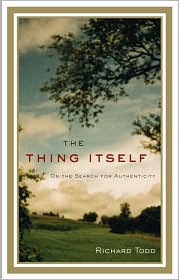Riverhead, 2008
I’m haunted by past sins and follies: my quip that hurt a friend; the foolish act trying to impress a woman; my silence when my father, being thrown out by my mother, told me he loved me. How we leak guilt and shame. Dear God, forgive us our trespasses. Yet isn’t anyone worth knowing aware he’s let himself down?
The Thing Itself: On the Search for Authenticity meditates upon how we feel at this edgy moment about ourselves in our diminished nation. There’s much to lament with so much shorn of context and community. Consider Richard Todd’s local mall—the same as yours or mine: a farmer sold out for profit; a developer bulldozed woods and fields for gain; the mall’s cash registers hum; and we stampede there in welcome postmodern anonymity. “Yet something unfortunate has happened here,” writes Todd. “You can feel it. As you drive past, the scene is not uplifting. No one has been exploited, but everyone has. This is the feeling, of course, that exudes from much of built America, from our endless date-raped landscapes. Something that began as consensual has ended in tears.”
Such malaise wouldn’t be important, except it is. Reading The Thing Itself, I’m reminded how intrinsic emotion is to the matrix we use to gauge what’s worthy—ideas, eateries, politicians, potential mates, house painters. Todd draws on thinkers and poets who’ve grappled with why things don’t feel so good, and he rambles into America in search of its soul. A former executive editor of The Atlantic Monthly, Todd’s poignant scenes arise as if unbidden, the way memories do. At Disney World, he stumbles into a “character breakfast” and Chip, a walking stuffed animal, mauls his dignity. In a Las Vegas bar, Todd watches geysers choreographed to Appalachian Spring, the spectacle an oddly pleasant sacrilege. At colonial theme parks, he fixates upon docents of a certain age wearing mobcaps. Even curmudgeonly Todd finds these things harmless in a certain mood, but they can strike a pang to the heart: here’s the sad residue of authenticity that’s dead and gone.
Despite its probing of our roiled psyches and diminished situation, The Thing Itself left me soberly cheered. We’re a clever species that craves a solid self; we’re successful but yearn to be good. And Todd’s inner life (his thoughts, his tears, his prayers) stirred me, suggesting how I might grow. Nurture spirit. Read and think. Keep a cold eye on society but see what’s holy.
“Most people can’t be saints, and most objects can’t be art,” Todd whispers, “but in each case the extent to which they are marked by the impulse toward grace is a measure of their worth.”
—
Richard Gilbert earned an MFA in Goucher College’s creative nonfiction program in 2007, where he knew Richard Todd. Gilbert’s work has appeared in Orion, SNReview, and Farming: People, Land, and Community. He teaches at Ohio University and is working on a memoir. He maintains NARRATIVE, a blog on narrative nonfiction writing and teaching.
